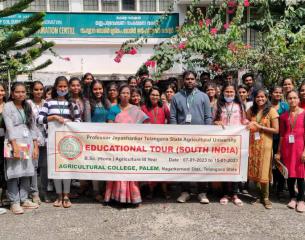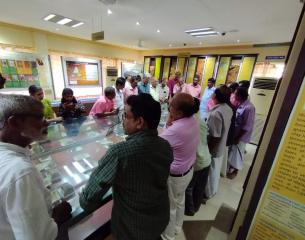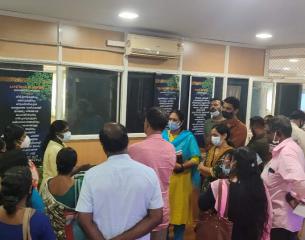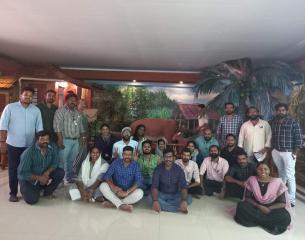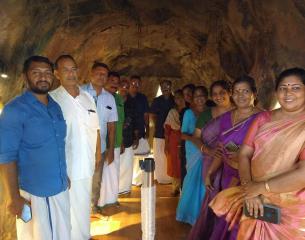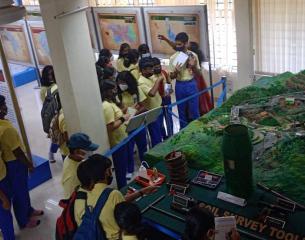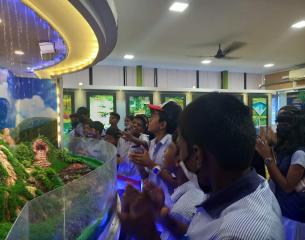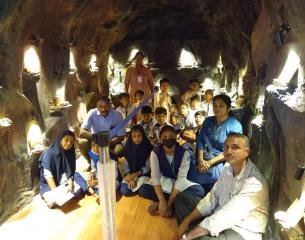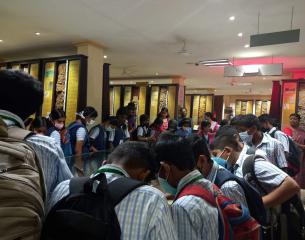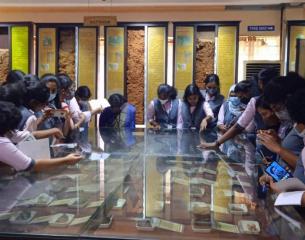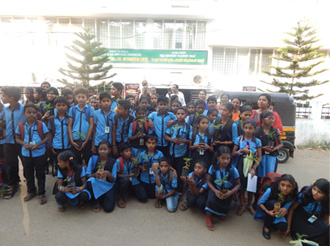
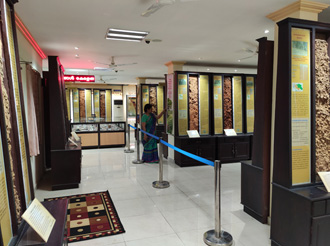


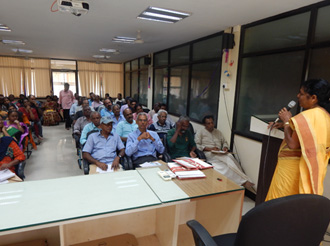
|
Contact – Principal Soil Chemist Central Soil Analytical lab Parottukonam Thiruvananthapuram Phone no - 0471 2541776 email - psc.csal@gmail.com |
In tune with the growing concerns in the natural resource management front, Kerala government entrusted the establishment of a State Soil Museum to the Department of Soil Survey & Soil Conservation. The Department of Soil Survey and Soil Conservation is the premier institution dealing exclusively on soils of the State. Soil survey activities have helped to identify soils that occur extensively and that have special significance. The Soil Museum is an attempt to bring all these soils and their live models under one roof. Soil Museum and Soil Information Centre is established in the first floor of the Central Soil Analytical Laboratory at Parottukonam, Thiruvananthapuram. This museum is therefore the first of its kind in the world with the largest collection of soil monoliths and display materials. Potential user groups of soil museum would include farmers, soil scientists, research scholars, planners, administrators, students, extension personnel, non- governmental organizations and general public.
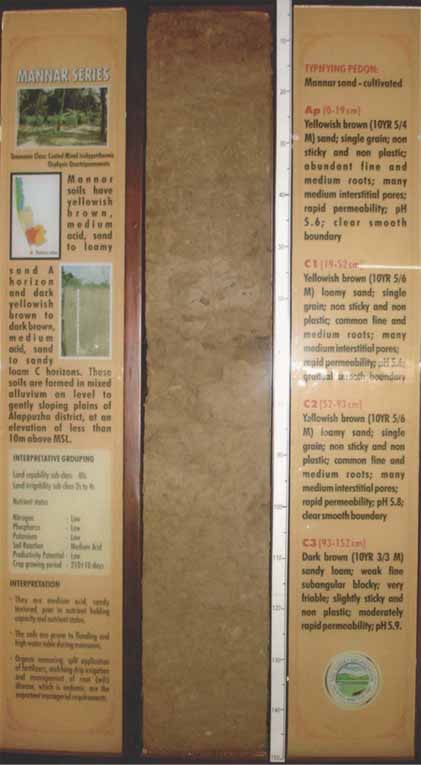 OBJECTIVES
OBJECTIVES
- Reference centre on the Soils of Kerala
- Display of soil monoliths of the Bench Mark Soils of the Major land Resource Areas of all districts
- Display of rocks and minerals of the State
- Reference base for planning and undertaking soil series based agricultural research activities in the State
- Mini theatre for providing information on soils and environmental issues at State and National Level through video shows
- Soil Information Centre displaying soil maps, watershed maps and related maps of all districts
- Display of watershed model, the basic unit of all developmental programs, and models of different soil and water conservation structures
BENCH MARK SOILS
Eighty two Bench Mark soils have been identified in the 27 different Major Land Resource Areas of Kerala for which soil monoliths were collected. A Bench Mark Soil is one that is widely extensive, holds a key position in the soil classification system and is of special significance to farming, engineering or other uses. The basic objective of Bench Mark Soil is to focus attention on extensively occurring soils and their agronomic concepts for wider acceptability of interpretations and for extrapolation of research data. The Bench Mark Soils are selected from among the existing and established soils that represent typical range of soil conditions within the state and having extensive coverage. It is the representative of the most extensive soils in major land resource area or agro ecological zone of the state and/or holding a key position in Soil Taxonomy. The selected soil should have large amount of research data for making transfer of agro technology feasible. Studies of Bench Mark Soils helps in soil correlation, standardization of legends, prediction of soil behaviour, agro technology transfer and planning further research in allied disciplines.
SOIL MONOLITHS
A Soil Monolith is a sample of a soil profile with undisturbed structure, including several or all the basic genetic horizons. The soil monoliths in the soil museum are arranged district-wise and based on Major land Resource Areas (MLRA’s). Detailed information on soil series, their classification (Soil Taxonomy, 1994), landscape, crops, climate, typical profile characteristics fertility status etc are displayed. A table showing the list of Bench Mark Soils, their physiography and MLRA unit are given below.
|
|
Soil series |
Physiography |
|
|
THIRUVANANTHAPURAM DISTRICT |
|
|
1 |
Kazhakuttam series |
Lowland |
|
2 |
Amaravila series |
Lowland |
|
3 |
Vellayani series |
Midland |
|
4 |
Trivandrum series |
Midland |
|
6 |
Nedumangad series |
Midupland |
|
7 |
Kallar series |
Midupland |
|
8 |
Ponmudi series |
Highland |
|
|
KOLLAM DISTRICT |
|
|
9 |
Neendakara series |
Lowland |
|
10 |
Varkala series |
Midland |
|
11 |
Sooranad series |
Midland |
|
12 |
Mylom series |
Midland |
|
13 |
Ummannoor series |
Midland |
|
14 |
Karavaloor series |
Midupland |
|
PATHANAMTHITTA DISTRICT |
|
|
|
15 |
Airavan series |
Midland |
|
16 |
Adoor series |
Midland |
|
17 |
Ayroor series |
Midland |
|
18 |
Kumaranperur series |
Midupland |
|
19 |
Gudarakal series |
Highland |
|
|
ALAPPUZHA DISTRICT |
|
|
20 |
Alappuzha series |
Lowland |
|
21 |
Punnapra series |
Lowland |
|
22 |
Purakkad series |
Lowland |
|
23 |
Champakulam series |
Lowland |
|
24 |
Mannar series |
Lowland |
|
|
KOTTAYAM DISTRICT |
|
|
25 |
Manjoor series |
Lowland |
|
26 |
Parampuzha series |
Midland |
|
27 |
Kottappuram series |
Midland |
|
28 |
Paippara series |
Midupland |
|
29 |
Nellapara series |
Upland |
|
|
IDUKKI DISTRICT |
|
|
30 |
Manakkad series |
Midland |
|
31 |
Thommankuthu series |
Upland |
|
32 |
Chinnar series |
Highland |
|
33 |
Venmani series |
Highland |
|
34 |
Pampadumpara series |
Highland |
|
35 |
Anamudi series |
Mountainous |
|
|
ERNAKULAM DISTRICT |
|
|
36 |
Udayamperoor series |
Lowland |
|
37 |
Vypeen series |
Lowland |
|
38 |
Ikkaranad series |
Midland |
|
39 |
Punnamattom series |
Midland |
|
40 |
Perumbavoor series |
Midland |
|
41 |
Odakkali series |
Midupland |
|
|
THRISSUR DISTRICT |
|
|
42 |
Manathala series |
Lowland |
|
43 |
Konchira series |
Lowland |
|
44 |
Kizhapallikara series |
Midland |
|
45 |
Koratty series |
Midland |
|
46 |
Kozhukully series |
Midupland |
|
47 |
Painkulam series |
Upland |
|
|
PALAKKAD DISTRICT |
|
|
48 |
Thirunarayanapuram series |
Midland |
|
49 |
Karakurussi series |
Midland |
|
50 |
Mannur series |
Midland |
|
51 |
Bhavaji Nagar series |
Midupland |
|
52 |
Anuppur series |
Midupland |
|
53 |
Uthrampallam series |
Midupland |
|
54 |
Agali series |
Upland |
|
|
MALAPPURAM DISTRICT |
|
|
55 |
Triparangode series |
Lowland |
|
56 |
Angadipuram series |
Midland |
|
57 |
Naduvattom series |
Midupland |
|
58 |
Vazhikadavu series |
Midupland |
|
59 |
Mannamkulam series |
Upland |
|
60 |
Walakkad series |
Mountaineous |
|
|
WAYANAD DISTRICT |
|
|
61 |
Battuvady series |
Highland |
|
62 |
Pulpally series |
Highland |
|
63 |
Mananthavady series |
Highland |
|
64 |
Sulthan Bathery series |
Highland |
|
65 |
Periya series |
Highland |
|
66 |
Meppadi series |
Mountaineous |
|
|
KOZHIKODE DISTRICT |
|
|
67 |
Elathur series |
Lowland |
|
68 |
Chelapram series |
Lowland |
|
69 |
Kakkodi series |
Midland |
|
70 |
Nanminda series |
Midland |
|
71 |
Kunnamangalam series |
Midland |
|
72 |
Thruvampadi series |
Midupland |
|
|
KANNUR DISTRICT |
|
|
73 |
Narikkot series |
Lowland |
|
74 |
Kunhimangalam series |
Lowland |
|
74 |
Arathil series |
Midland |
|
75 |
Kolikkadavu series |
Midupland |
|
76 |
Wanjiyam series |
Upland |
|
77 |
Kunnathuru series |
Highland |
|
|
KASARGOD DISTRICT |
|
|
78 |
Hosdurg series |
Lowland |
|
79 |
Thekkila series |
Midland |
|
80 |
Edanad series |
Midupland |
|
81 |
Payalam series |
Upland |
|
82 |
Maloth series |
Upland |
ROCKS AND MINERALS
The common rocks and minerals seen in Kerala are displayed in the soil museum
SOIL INFORMATION CENTRE
Soil Information Centre is intended as a documentation and reference centre on the soils of Kerala. The center provides soil information in the form of hard copy, digital files of published maps and reports. The access and query facility on the soils of Kerala provides a detailed description on soil types, their limitations, ameliorative meaures etc. The success stories in the soil conservation front are also available for reference in the library.
WATERSHED MODEL
1. The word ‘watershed’ is derived from German ‘Wasserscheide’: wasser (water) & scheide (divide / parting)
1. Watershed is defined as a geo-hydrological unit draining to a common point by a system of drains. It is an area of land and water bounded by a drainage divide within which the surface run-off collects and flows out through a single outlet into a larger river or lake.
2. Each watershed is divided from the adjacent watersheds by a drainage divide usually the high elevation perimeter of that area (ridge line).
3. Size of the watershed depends upon the area covered by the selected drainage line, whereby smaller streams result in small area watersheds and larger streams give rise to larger area of the watersheds.
4. Watersheds are seen in different shapes. Circular, square, rectangle, oval, triangle etc are the common shapes identified.
Presently, the watershed is the basic unit for implementation and development of all agricultural schemes. A watershed model is displayed to highlight the concepts of watershed delineation and integrated management.
MINI THEATRE
The mini theatre shows videos on soil survey and soil conservation activities in the State. The state of the planet is documentarised stressing the need for conservation activities. The soil perspective is highlighted in all videos. Videos on environmental concerns are also shown.
SOIL AND WATER CONSERVATION MODELS
Soil and water conservation practices are highlighted through models. Detailed descriptions are also displayed.
DISTRICT-WISE SOIL AND WATERSHED MAPS
Display and documentation materials on Geology of Kerala, geological time periods, physiography, soils of kerala, watersheds of all 14 districts are put up. The departmental activites are also shown. The output of field soil survey activities is inventory reports and maps. The reconnissance soil survey maps of all districts in 1:50,000 scale is displayed along with prioritized district-wise microwatershed atlas. Each soil map gives the soil associations encountered in each district along with their physiography. The watershed atlas is prioritized, delineated and codified at micro level for use of local self government institutions.
| Entry fee | |
| School students | - Rs. 15/- |
| College students | – Rs. 20/- |
| General Public | – Rs.30/- |
Institute for Watershed Development and Management, Kerala (IWDM-K), Chadayamangalam is the State level Training and Extension Centre of the Department of Soil Survey and Soil Conservation is playing a key role in enriching the awareness of conservation of natural resources to the various functionaries associated with watershed programmes, Eco-restoration and conservation of environment.
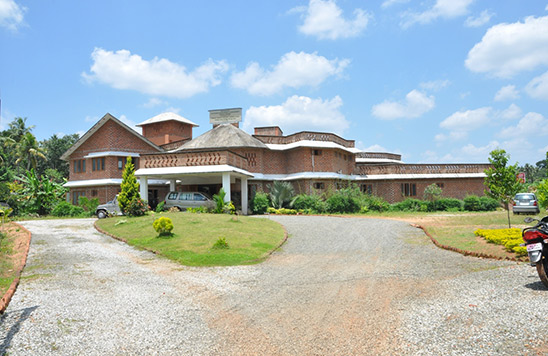
Institute for Watershed Development and Management, Kerala (IWDM-K)
|
Location |
The institute is located on the side of M. C. Road in an eco friendly atmosphere at the foothills of Chadayamangalam hills in Chadayamangalam panchayath in Kollam District. Extent of the area is more than 1 acres of land |
|
Objectives |
To impart training to government officials, people’s representatives, farmers, students and those who are associated with activities on watershed management, eco-restoration and environmental conservation. |
|
Infrastructure |
|
|
Faculty |
|
A brief outline of the different activities taken up at IWDM-K
Witihin a short span of four years, the institute could convey messages on different aspects of natural resource management to about 12,000 trainees
I. Campus training programmes
|
|
 |
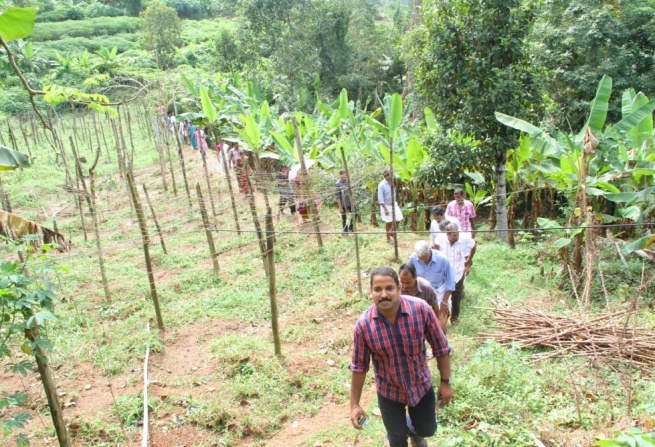 |
 |
Campus trainings were organised at the Institute of Watershed Development and management- Kerala (IWDM-K, Chadayamangalam) to District Officers/ Assistant Directors, Soil Conservation Officers/ Assistant Engineers, overseers, surveyors, work superintendants and clerical staff of the Department.
The major areas of deliberation includes,
- Water literacy (Jala saaksharatha)
- Importance of watershed development
- Delhi schedule of rates (DSR)
- GIS and GPS
- KSR and office matters
- Induction training to newly appointed officers and work superintendants
- Personality development etc.
II. Off campus trainings
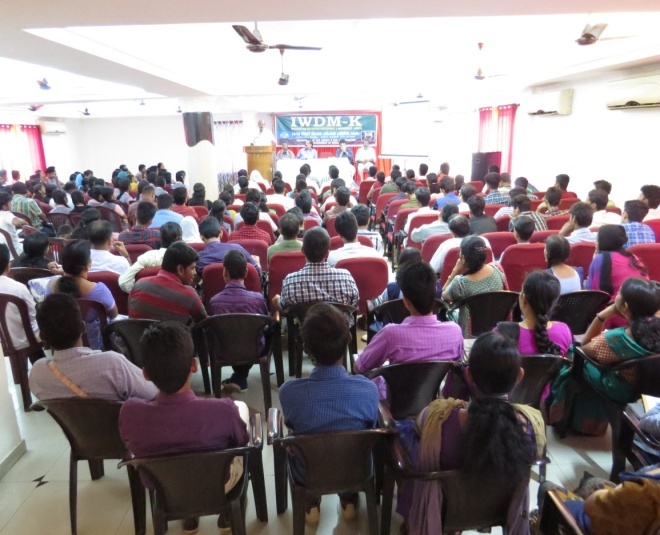
The institute extend training facilities to the needy even in the remote areas of districts Thrissur, Kasaragod, Kozhikode, Malappuram, Palakkad, Ernakulam etc based on different focal themes such as jala saaksharatha. The target groups were, kudumbasree members, students and peoples representatives.
III. Trainings conducted for external agencies
Being abona fide training centre in all aspects of watershed management and water literacy, government departments and other organizations such as Integrated Watershed Development Project (IWMP), Western Ghat Development Programme (WGDP), Training for B.Sc (Agri.) students from Kerala Agricultural University involved in natural resource management in the State seek the technical support of this institute and its experienced resource persons in this field.
IV. Trainings conducted by outside agencies at IWDMK
The nature friendly ambiance and tranquil atmosphere of IWDM-K, Chadayamangalam has made its reputation spread to all nearby places, so that people and organizations prefer this institute for their training purposes. The institute also provides outstanding infrastructure. This also adds to the non- tax revenue collection of the department. Various government departments and other organizations come forward to utilize the facility at the station..
V. Faculty support for external organizations
Within a short span of four years, IWDM-K, Chadayamangalam has won a renowned status as the pioneer training institute in the State dealing with water literacy and natural resource management in watershed concept. This makes the resource persons of the institute inevitable for all training programmes dealing with this subject in the state. In addition to the campus and off campus trainings, our officers has rendered faculty services to various training programmes organised by educational institutions, farmer’s groups and various other organisations all over the state.
VI. Exhibitions
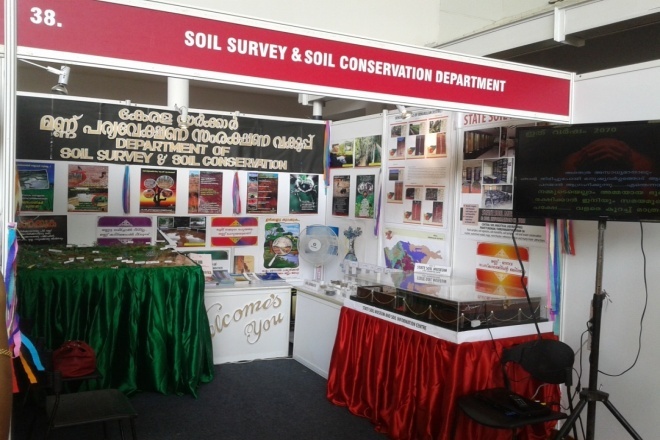
The institute made active participations in several exhibitions, melas and celebrations of important days, by setting up pavilions with exhibits, posters, video shows and watershed models inorder to extend awareness among the masses on the significance of soil and water conservation.
VII. IGNOU Programme Study Centre at IWDM-K, Chadayanamgalam
The department of Soil Survey and Soil Conservation, Government of Kerala, being a pioneer agency in the field of soil and water conservation and watershed development in the state with its immense experience in the field has been selected as Programme Study Centre to offer courses in the field of watershed management at its training and extension centre at Chadayamangalam. The Centre (40025) functions at the IWDM-K campus offer courses relevant to natural resource management so as to fulfill the objective of developing qualified man power for various watershed programmes implemented all over the country. The IGNOU has started three courses –
- One year Diploma course in Watershed Management (DWM)
Diploma in Watershed Management (DWM) : IWDM – K is proud of being one and only centre in South India among the five centers at the national level offered by IGNOU. Students from all over the State and also from Lakshadeep have been undergoing the course in IWDM-K.
| Duration of the course | 1year |
| Subjects covered | Management of natural resources, farm resources and human resources. |
| Qualification for enrolment | Plus-two or equivalent |
| Course fees | Rs.10000/. Fees concession of 50% admissible for BPL families and those from rural areas provided by Ministry of Land Resources, Government of India |
For more details please contact the Deputy Director of Soil Conservation, IWDM-K, Chadayamangalam, Kollam. Phone : 0474 2475051, e-mail : iwdmkerala@gmail.com
Courses Offered
|
IWDM – K is proud of being one and only centre in South India among the five centers at the national level offered by IGNOU. Students from all over the State and also from Lakshadeep have been undergoing the course in IWDM-K. For more details : COURSES Application invited for IGNOU courses at IWDMK, Chadayamangalam |
|
Diploma in Watershed Management (DWM) : Duration of the course : 1year Subjects covered : Management of natural resources, farm resources and human resources. Qualification for enrolment : Plus-two or equivalent
Fees concession of 50% admissible for BPL families and those from rural areas provided by Ministry of Land Resources, Government of India |
|
Basics of Remote Sensing, Geographic Information Systems and Global Navigational Satellite Systems For more details The Directorate of Soil Survey and Soil conservation has been identified as an outreach study centre of the Indian Institute of Remote Sensing, Dehradun. The Indian Institute of Remote Sensing (IIRS), unit of Indian Space Research Organisation (ISRO), Department of Space, Government of India is a premier education, training and research institute for capacity building in the field of Remote Sensing, Geo-information, positioning & navigation technology and its applications. Fifteen courses have been completed so far at the centre. Sixteenth course is ongoing now. Courses
|

